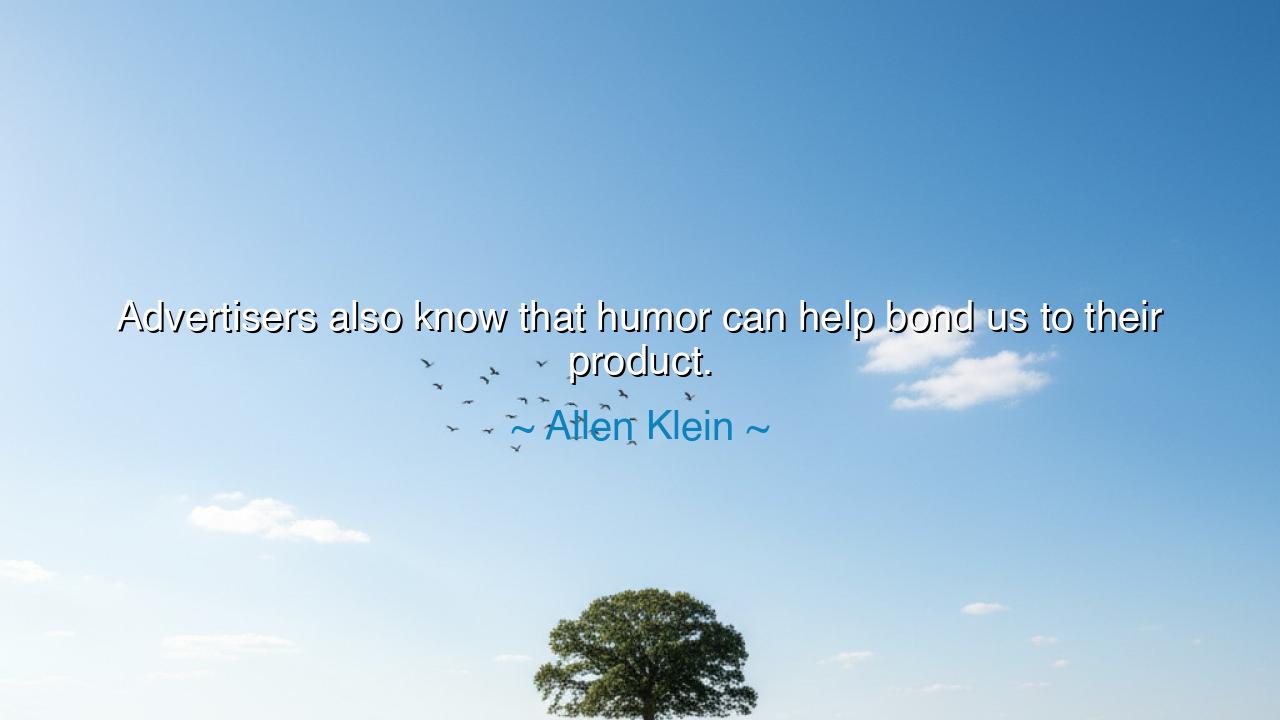
Advertisers also know that humor can help bond us to their






The words of Allen Klein, “Advertisers also know that humor can help bond us to their product,” though simple in sound, reveal a truth as old as storytelling itself — that laughter is a bridge between hearts, a sacred thread that binds the giver and the receiver in a moment of shared humanity. In this age of commerce and persuasion, Klein unmasks a principle far deeper than marketing: that humor has the power to connect, to soften resistance, and to create memory. When we laugh, we open ourselves — our defenses lower, our attention sharpens, and our hearts lean forward. The wise have always known this: that the one who can make another smile can plant an idea where logic alone would fail.
In the ancient world, the art of rhetoric — the craft of persuasion — was regarded as one of the highest skills of the philosopher and the leader. The great orators of Greece and Rome, such as Demosthenes and Cicero, knew that emotion, not argument, swayed the soul. A well-timed jest could do what a hundred solemn truths could not: it could make the listener trust. The audience who laughed with the speaker began to see him as a friend, not a stranger; his message, once foreign, now seemed familiar. This is the same magic that advertisers wield today, not with the gravitas of philosophers, but with the cunning of storytellers who understand that joy sells better than logic.
For humor, at its heart, is a shared experience of recognition. When we laugh, we acknowledge a truth — often hidden, sometimes uncomfortable — revealed in an unexpected way. The mind says, “I know this,” and the body responds with delight. The advertiser, like the bard of old, crafts this recognition carefully: a clever phrase, an absurd scene, a playful exaggeration. In that moment of laughter, we are no longer analyzing — we are feeling. And once a feeling is linked to a brand or an idea, it roots itself in the memory with the strength of affection. Humor bonds us, not because it deceives, but because it invites us to join in on the joke.
Consider the tale of Diogenes the Cynic, the philosopher who lived in a barrel and mocked the hypocrisy of his fellow Athenians. When Alexander the Great sought to meet him, asking, “Is there anything I can do for you?” Diogenes replied, “Yes — stand out of my sunlight.” The crowd laughed, but that laughter carried a truth sharper than any argument. In a single jest, Diogenes revealed the folly of power and the purity of simplicity. His humor did not entertain; it enlightened. And though he sold no product, he achieved what every advertiser and teacher seeks: he made his message unforgettable.
So too, in the world of modern persuasion, humor carries this ancient lineage. The merchant who makes his audience laugh stands in the same tradition as the storyteller around the fire, the philosopher in the square, the poet who makes wisdom dance in play. The purpose may have changed — now it is to sell, not to teach — but the method remains sacred. Laughter builds trust, and trust builds attachment. The listener, warmed by mirth, no longer feels manipulated, but engaged. In this way, humor becomes not only a tool of commerce, but a mirror of the human heart — forever seeking joy, even in the realm of consumption.
Yet Klein’s words carry a warning as well. The power to bond through humor is double-edged. What can connect can also deceive. The ancients warned against the flatterer, who uses charm to lead men astray. The same smile that builds community can also breed complacency. When we laugh, we must remain aware of what we are laughing with — for humor can bind us to ideas, habits, and desires we might otherwise question. The wise must learn to laugh freely, yet think deeply. Joy should be a gateway to awareness, not a substitute for it.
Let this then be the teaching: Laughter is a sacred force — it unites, disarms, and endures. To use it is to hold power over hearts; to receive it is to open one’s spirit to influence. In life, as in art, let your humor be kind, truthful, and purposeful. Seek connection through joy, not manipulation. And when others make you laugh, pause to ask: what truth hides behind this smile?
For as Allen Klein reminds us, those who master humor can shape the bonds between people — and in shaping those bonds, they shape the world itself. Use laughter, therefore, not as a weapon or a lure, but as a bridge — one that leads not to profit alone, but to understanding, warmth, and the shared light of the human heart.






AAdministratorAdministrator
Welcome, honored guests. Please leave a comment, we will respond soon